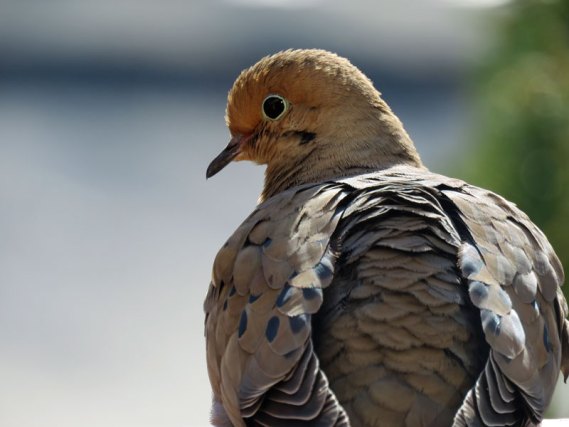
Mourning doves have been visiting me off and on since my mother died twenty-eight years ago. They seem to arrive when I could use a little encouragement. When I used to garden one would often sit near me and watch me as I worked. Once one walked with me all the way from my garden to the swimming pool in our complex. Lately one comes to sit on the balcony almost daily and coos for as long as an hour at a time. I find her company very comforting.

Sunday morning I decided to try to photograph her through the sliding glass doors and was thrilled with the results. She didn’t seem to mind posing. I know they are plain birds, but that’s exactly why I find them so beautiful! I love them the same way I love my gulls.

In this sad world of ours, sorrow comes to all; and, to the young, it comes with bitterest agony, because it takes them unawares. The older have learned to ever expect it.
~ Abraham Lincoln
(Letter to Fanny McCullough, December 23, 1862)

When I first read the Lincoln quote six years ago, after my father died, I remember thinking how true it was. When my mother died I was so young it came as a terrible blow and I needed therapy to work through the grief. By the time my father died it was no longer such a shocking experience. I deeply felt the pain of loss, but it wasn’t unexpected.

We now have 36 confirmed cases of COVID-19 in our town. There are moments I feel terribly anxious about this. It’s starting to sink in that it may be be many months or even more than a year before it will be safe to visit our grandchildren again. As it stands now, I don’t think I will feel free from danger before there is a vaccine. But we are trying to make the best of it and even find a sense of humor at times.

I find myself wondering how my parents would respond to the coronavirus pandemic. I imagine they would probably be just as blindsided as the rest of humanity. But since Mother Nature sees fit to send me such a sweet comforter as this lovely mourning dove I will stay grateful.

It’s not true that life is one damn thing after another — it’s one damn thing over and over.
~ Edna St. Vincent Millay
(Letter to Arthur Davison Ficke, October 24, 1930)


The Millay quote has been one of my favorites for a long time. It amuses me and helps me to laugh at the ironic situations I think I find myself in. The coronavirus pandemic feels unprecedented, and perhaps it is in my lifetime, but not at all in the history of the world.

In the trilogy Kristin Lavransdatter by Sigrid Undset, the protagonist, Kristin, dies from the Black Death at the end. It’s one thing to read about plague statistics in history books, quite another to experience what it must have been like while reading the words of an excellent storyteller. It comforts me to know others have felt the same fear.

Being a highly sensitive child, whenever I would lament about the sad things happening in the world my father would sigh and advise me, “‘Twas ever thus.” When my mother was dying of cancer and my heart ached for her suffering he would gently remind me that “every creature struggles for life.” He was a naturalist and scientist who taught us compassion for animals and people, but also prepared us for loss. Whenever one of our pets died he would tell us to “remember the good times.” I am so grateful for the lessons he taught me.

‘Twas ever thus — from childhood’s hour I’ve seen my fondest hopes decay, I never loved a tree or flower but ’twas the first to fade away.
~ Charles Dickens
(The Old Curiosity Shop)








